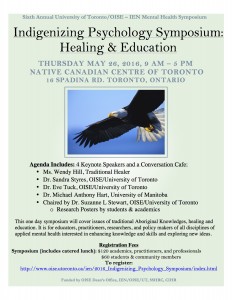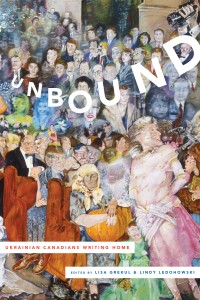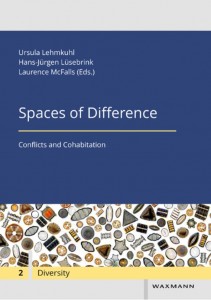The Sixth Annual OISE Indigenous Education Network Mental Health Symposium, 26 May 2016, Native Canadian Centre of Toronto, Canada
 The overarching goal of this Symposium is to build on our previous and current conceptions of Indigenous psychology and to provide new and innovative information, inquiry, and synthesis of mental health issues and solutions from Aboriginal knowledges. Through the development of new insights regarding Indigenous psychology throughout the Symposium, cutting edge and creative theories and models for addressing current mental health needs, including programming, counseling, and assessments of Indigenous peoples in Canada. This year’s symposium has a special focus on Healing and Education, taking a lead on discussing and strategizing implementation of the Truth and Reconciliation Commission’s Final Report’s recommendations.
The overarching goal of this Symposium is to build on our previous and current conceptions of Indigenous psychology and to provide new and innovative information, inquiry, and synthesis of mental health issues and solutions from Aboriginal knowledges. Through the development of new insights regarding Indigenous psychology throughout the Symposium, cutting edge and creative theories and models for addressing current mental health needs, including programming, counseling, and assessments of Indigenous peoples in Canada. This year’s symposium has a special focus on Healing and Education, taking a lead on discussing and strategizing implementation of the Truth and Reconciliation Commission’s Final Report’s recommendations.
This Symposium will achieve several general central objectives. First, to get a clear understanding of the psychology of Indigenous mental health and healing by articulating conceptual foundations that expand the current deficit model of mental health, enriching knowledge by focusing on the social processes of socio-political contexts, culture, and traditional knowledges and medicines and how these are linked to psychology. Secondly, to bring together leaders and innovators in the fields of Indigenous mental health from traditional, academic, and practitioner backgrounds. The sharing of ideas and ensuing dialogue of the diverse expertise of these high profile speakers will allow all attendees at the Symposium to take part in the creation of Indigenous healing solutions to psychological challenges that will be developed out of the strengths and resources that Indigenous individuals and communities provide to explain the key intersections of mental health, socio-political realities, and Aboriginal knowledges. Thirdly, The Annual Indigenous Education Network Mental Health Symposium was developed in 2010 by Dr. Suzanne Stewart to address a dire need for the advancement of the psychology of Indigenous mental health from Aboriginal knowledges, given the overwhelming lack of culturally based theory and models and the growing population of Indigenous peoples migrating to cities, many of whom seek fruitless mental health services from non-Indigenous perspectives.
More specific Symposium objectives include:
- Reaching a diverse audience of those interested in Indigenous mental health, including educators, researchers, academics, students, practitioners, policy makers, and community service administrators.
- Developing new and refining existing traditional Aboriginal approaches to current mental health issues.
- Engaging Indigenous and non-Indigenous individuals and communities in meaningful dialogue on Indigenous mental health and healing.
- Training and/or enhancing the careers of Aboriginal scholars, practitioners, policy makers, and administrators.
- Infusing Aboriginal ways of knowing into current applied psychology theories and practices.
- Preserving and documenting Aboriginal knowledges within the various levels of research, practice, and administration.
- Identifying knowledge mobilization tools to extend research and practice impact to Indigenous communities first, and then more broadly to non-Indigenous contexts.
- Considering diverse modalities for Indigenous psychology: e.g. traditional Indigenous, academic, Western, Eastern, African, hybrid, etc.
Specifically, the symposium will explore six key topic areas via oral presentations, workshops presentations, and cultural workshops by leading Canadian Indigenous health and healing practitioners. As well, we invite researcher, student, institutional, and community organization members to present posters within the following topics:
- Indigenous counselling and psychotherapy theory and practice
- Psychological assessment from Indigenous perspectives
- Integration of Indigenous and Western healing in mental health
- Traditional cultural healing in mental health service
- Research and ethical issues
- Policy, program, and administrative issues
You may submit abstracts for poster presentations in any of the above key topic areas until May 15, 2016. Please email name, title, and abstracts to this address.
For more information or to register please contact the Conference Committee.
Tickets are available here.
Registration fees:
$120 for academics, practitioners and professionals
$60 for students & community members
For registration, please visit the Conference Website.


